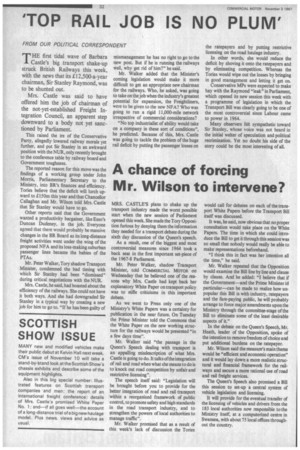'TOP RAIL JOB IS NO PLUM'
Page 34

If you've noticed an error in this article please click here to report it so we can fix it.
FROM OUR POLITICAL CORRESPONDENT
THE first tidal wave of Barbara HE
big transport shake-up struck British Railways this week, with the news that its £12,500-a-year chairman, Sir Stanley Raymond, was to be shunted out.
Mrs. Castle was said to have offered him the job of chairman of the not-yet-established Freight Integration Council, an apparent step downward to a body not yet sanctioned by Parliament.
This raised the ire of the Conservative Party, allegedly lowered railway morale yet further, and put Sir Stanley in an awkward position with the NUR, only recently brought to the conference table by railway board and Government toughness.
The reported reason for this move was the findings of a working group under John Morris, Parliamentary Secretary to the Ministry, into BR's finances and efficiency. Tories believe that the deficit will lurch upward to £.150m this year and that Chancellor Callaghan and Mr. Wilson told Mrs. Castle that Sir Stanley would have to go.
Other reports said that the Government wanted a productivity bargainer, like Esso's Duncan Dudeney, in the job. Everyone agreed that there would probably be massive changes in the BR Board as its long-distance freight activities went under the wing of the proposed NFA and its loss-making suburban passenger lines became the babies of the PTAs.
Mr. Peter Walker, Tory shadow Transport Minister, condemned the bad timing with which Sir Stanley had been "dismissed" during critical negotiations with the NUR.
Mrs. Castle, he said, had boasted about the efficiency of the railways. She could not have it both ways. And she had downgraded Sir Stanley in a typical way by creating a new job for him to go to. "If he has been guilty of mismanagement he has no right to go to the new post. But if he is running the railways well, why get rid of him?" he said.
Mr. Walker added that the Minister's coming legislation would make it more difficult to get an appropriate new chairman for the railways. Who, he asked, was going to take on the job when the industry's greatest potential for expansion, the Freightliners, were to be given to the new NFA? Who was going to run a rigid 11,000-mile network irrespective of commercial considerations?
"No top industrialist of ability would take on a company in these sort of conditions", he predicted. Because of this, Mrs. Castle was going to tackle the problem of the huge rail deficit by putting the passenger losses on the ratepayers and by putting restrictive licensing on the road haulage industry.
In other words, she would reduce the deficit by shoving it onto the ratepayers and by eliminating competition. Whereas the Tories would wipe out the losses by bringing in good management and letting it get on.
Conservative MPs were expected to make hay with the Raymond "leak" in Parliament, which opened its new session this week with a programme of legislation in which the Transport Bill was clearly going to be one of the most controversial since Labour came to power in 1964.
Many observers felt sympathetic toward Sir Stanley, whose voice was not heard in the initial welter of speculation and political recrimination. Yet no doubt his side of the story could be the most interesting of all.








































































































































